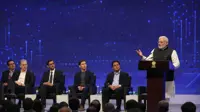Google to work with publishers and Twitter to create new kind of web link and article storage system
12 Sep 2015
In a world where people were increasingly reading everything on mobile phones, a few seconds of load time could mean the gain or loss of millions of readers and advertising dollars. Now Google plans to help publishers - and itself by speeding up things.
Google would work with the social media service Twitter and major news publishers like The Guardian and The New York Times to create a new kind of web link and article storage system capable of loading online news articles and digital magazine pieces in a few milliseconds, The New York Times reported citing several people involved in the project.
This was a fraction of the 5 to 10 seconds it took for loading a typical website.
The project was still in its early stages, and many details were not yet decided, according to the people involved, who spoke on the condition of anonymity as the partners had not yet made an announcement.
The goal was to develop a universal standard for publishers - one that could be used to load articles more quickly wherever they appeared. However, accomplishing that even as it sought to retain the look and feel of those pages had proved difficult.
The effort is also an attempt to protect the web from mobile applications and steer publishers away from the closed, proprietary systems that were being built by companies like Facebook, Apple and Snapchat.
Facebook, Apple and Snapchat had earlier launched similar initiatives.
However, the big difference between those efforts and this one was, Google and Twitter were creating their publishing tools as an open source project, and hoped to convince multiple tech companies to adopt it.
''The world needs an answer to proprietary instant articles, and Twitter and Google could provide it,'' said a person familiar with the companies' thinking, re/code reported.
Another difference between the Google / Twitter plan and other mobile publishing projects was that Google and Twitter would not host publishers' content, rather the plan was to show readers cached Web pages - a ''snapshot of [a] webpage,'' in Google's words - from publishers' sites.
That distinction might not mean much to publishers but it might be important to both publishers and the tech companies that showed their stuff and especially for Google, which was sensitive to charges that it was trying to host more content instead of sending search users to other sites.
European publishers, particularly had been miffed with Google's practice of placing snippets of news stories in search results.




















